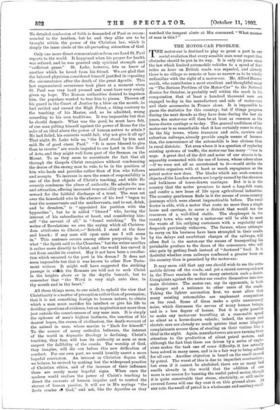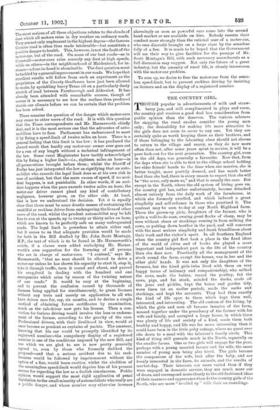THE MOTOR-CAR PROBLEM.
THE motor-car is destined to play so great a part in our social evolution that every sensible man must regret that obstacles should be put in its way. it is only six years since the law which limited automobile vehicles to a speed of four miles an hour on British roads was repealed, and already there is no village so remote or lane so narrow as to be wholly unfamiliar with the sight of a motor-car. Mr. Alfred Harms- worth, who contributes a most excellent and thoughtful essay on "The Serious Problem of the Motor-Car" to the National Review for October, is probably well within the mark in his computation that at least a hundred thousand men are engaged to-day in the manufacture and sale of motor-cars and their accessories in France alone. It is impossible to guess the statistics for this country; but if things progress during the next decade as they have done during the last six years, the motor-ear will then he at least as common as the horse-drawn carriage is to-day. The general usefulness of the motor-car is so remarkable that it has certainly come to stay. In the big towns, where tramcars and cabs, carriers and suburban railways, already provide ample means of locomo- tion, the convenience of the automobile is less obvious than in rural districts. Yet even where it is a question of replacing existing systems of traffic, the motor-car has many P1.1ims to urge. A great deal of the dirt and noise of our streets is in- separably connected with the use of horses, whose odour alone —if we were not all so accustomed to it—would strike the sensitive organism with at least as much repugnance as the
petrol motor now does. The blocks which are such common objects of the London streets are largely caused by the slowness and bulkiness of horse-drawn carriages. But it is in the country that the motor promises to meet a long-felt want, and confer a new lease of life upon agricultural industries. The country gentleman finds in it the means of cross-country journeys which were almost impracticable before. The rural doctor is able, with a motor that costs no more than a single horse and carriage, to cover a district that would tax the resources of a well-filled stable. The shopkeeper in the county town who sets up a motor-car will he able to meet the wants of his outlying customers with a regularity and despatch previously unknown. The farmer, whose attempts to carry on his business have been strangled in their cradle by the delays and exorbitant charges of the railways, will often find ia the motor-car the means of transporting his perishable produce to the doors of the consumers, who will also gain by getting fresh instead of " doctored " food. It is doubtful whether even railways conferred a greater boon on the country than is promised by the motor-car.
It may seem odd that any one should wish to see the auto- mobile driven off the roads, and yet a recent correspondence in the Times reminds us that many entertain such a desire. Complaints against the motor-car resolve themselves into two main divisions. The motor-car, say its opponents, is both a danger and a nuisance to other users of the roads. Taking the lighter accusation first, we must allow that many existing automobiles are unpleasant companions on the road. Some of them make a quite unnecessary noise, which distresses the nerves of many human beings, and in a less degree of horses. But it is quite possible to make any motor-car travelling at a reasonable speed as silent as a horse-drawn vehicle ; indeed, the steam and electric cars are already so much quieter that some illogical complainants accuse them of stealing on their victims like a thief in the night. Again, manufacturers are now turning their attention to the production of silent petrol motors, and although the fact that these are driven by a series of explo- sions makes the task one of some difficulty, it has actually been solved in many cases, and is in a fair way to being solved for all cars. Another objection is based on the smell caused by petrol. The worst of this is due to imperfect combustion; but even if it cannot be abolished, there are so many had smells already in the world that the addition of one more is no reason for banning the useful petrol motor, though it is quite conceivable that steam, electricity, or still undis- covered forces will one day oust it on this ground alone. At any rate, the smell of petrol is a wholesome and sanitary smell The most serious of all these objections relates to the clouds of dust which all motors raise in dry weather on ordinary roads. They are not only unpleasant in the highest degree—the famous Cornice road is often thus made intolerable—but constitute a positive danger to health. This, however, is not the fault of the motor-car, but of the road. On some of our best roads—as in Cornwall—motor-cars raise scarcely any dust at high speeds, while on others—in the neighbourhood of Maidenhead, for in- stance--a four-in-hand is abominable. The dust question must be tackled by a general improvement in our roads. We hope that excellent results will follow from such an experiment as the proprietors of the County Gentleman have just been allowed to make, by sprinkling heavy Texas oil on a particularly dusty stretch of road between Farnborough and Aldershot. It has already been attended with remarkable success, though of course it is necessary to see how the surface thus produced stands our climate before we can be certain that the problem has been solved.
There remains the question of the danger which motor-cars may cause to other users of the road. It is with this question that the Times correspondents and Mr. Harmsworth chiefly deal, and it is the most serious one that the advocates of auto- mobilism have to face. Parliament has endeavoured to meet it by fixing a speed-limit of twelve miles an hour. There is a general feeling that this limit is too low : it has produced the absurd result that hardly any motor-car owner ever goes out for a run of any length without a technical infringement of the law. Some rural Magistrates have tacitly acknowledged this by fixing a higher limit—i.e., eighteen miles an hour—in all prosecutions brought before them; whilst the Sheriff of Forfar has just interpreted the law as signifying that an auto- mobilist who exceeds the legal limit does so at his own risk in case of accident, but that the mere excess of speed, if no acci- dent happens, is not punishable. In other words, if an acci- dent happens when the pace exceeds twelve miles an hour, the motor-car driver cannot plead any kind of contributory negligence, however gross, on the other side. At least, that is how we understand the decision. Yet it is equally clear that there must be some drastic means of restraining the unskilful or reckless driver from endangering the lives of other users of the road, whilst the prudent automobilist may be left free to run at the speeds, up to twenty or thirty miles an hour, which are known to be perfectly safe on many unfrequented roads. The legal limit is powerless to attain either end, but it seems to us that adequate provision would be made for both in the Bill drafted by Mr. John Scott Montagu, M.P., the text of which is to be found in Mr. Harmsworth's article, if a clause were added embodying Mr. Harms- worth's own suggestion for the licensing of all persons who are in charge of motor-cars. "I contend," says Mr. Harmsworth, "that no man should be allowed to drive a motor-car unless he has shown his capacity to start it, stop it, take it through traffic, turn it round and about, and proved his sang-froid in dealing with the hundred and one emergencies which arise by reason of the twisting nature of our roads." It would be easy at the beginning, and to prevent the confusion caused by thousands of licenses being applied for simultaneously, to grant licenses without any tests and merely on application to all who have driven cars for, say, six months, and to devise a simple method of obtaining future certificates by examination, much as the cab-driver now gets his license. Then a con- viction for furious driving would involve the loss or endorse- ment of the license, according to the gravity of the case. Professional drivers, with their livelihood in view, would at once become as prudent as captains of yachts. The amateur, knowing that his car could be promptly identified by its registered number—the compulsory display of a registered number is one of the conditions imposed by the new Bill, and one which we are glad to see is now pretty generally agreed to, even by those who formerly disliked the proposal—and that a serious accident due to his reck- lessness would be followed by imprisonment without the Option of a fine, would learn caution, whilst the abolition of the ineaningless speed-limit would deprive him of his present excuse for regarding the law as a foolish simulacrum. Public .Opinion would support the most rigid application of penal legislation to the small minority of automobilists who really are a public danger, and whose number may otherwise increase
alarmingly as soon as powerful cars come into the second hand market or are available on hire. Nobody resents their conduct more strongly than the rational user of a motor-car, who sees discredit brought on a large class by the senseless folly of a few. It is much to be hoped that the Government will see their way to give facilities for the passage of Mr. Scott Montagu's Bill, with such necessary amendments as a full discussion may suggest. Not only the future of a great industry, but the amenity of rural life, is closely interwoven with the motor-car problem.
To sum up, we desire to free the motor-car from the sense- less speed-limit, but to prevent reckless driving by insisting on licenses and on the display of a registered number.











































 Previous page
Previous page